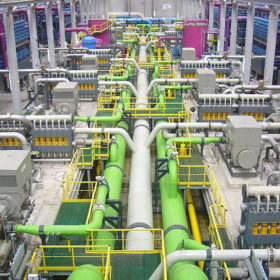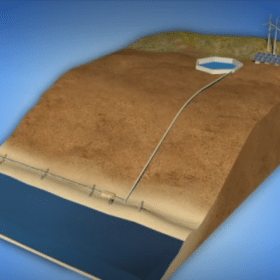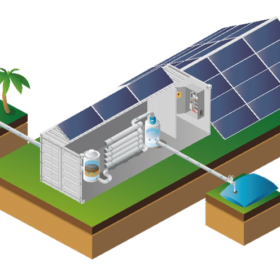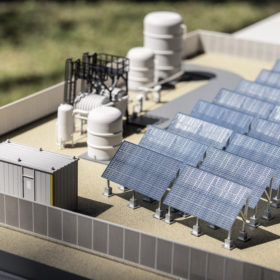Floating PV for desalination
Spanish water-treatment specialist Emalsa has teamed up with Instituto Tecnologico de Canarias ITC and Universidad Europea de Canarias to study the feasibility of a 1.53 MW floating solar plant that could potentially power the Piedra Santa desalination plant in Gran Canaria.
Pumped hydro with desalination, powered by renewables
EDF and Oceanus plan to build a pumped hydro storage station and a desalination system powered by wind and solar. The system will use saltwater to produce hydropower during periods of high demand, while producing affordable freshwater.
French startups develop PV-powered desalination solution
Two French companies have collaborated on the development of the Osmo-Watt system, which is powered by solar panels. They claim that the technology can produce up to 100 cubic meters of drinking water per day.
PV powered desalination is “the most competitive design”
Scientists in France conducted an analysis on the competitiveness of water desalination, taking a large scale project planned for Morocco as a case study. The research concludes that PV without storage is the cheapest option to power desalinators, and will likely remain so until at least 2030.
Solar driving efficient electrochemical water treatment
Researchers from the United States have investigated how solar could help electrochemical methods for water treatment become more competitive. The scientists analyzed how electrochemical technologies such as electrocoagulation, capacitive deionization, electrodialysis, and electrodeionization may be combined with solar power generation.
Solar can drive down levelized cost of desalinated water
A study from Finland’s Lappeenranta University of Technology states decarbonization of desalination could help achieve a levelized cost of water of €0.32-1.66 per cubic meter. Solar and storage are expected to play a decisive role.
The life of brine
Solar remains an interesting option to power water desalination despite obstacles to its widespread adoption. A recent study has highlighted the processing or dumping of brine waste as an important factor to consider.
Desalinating water with mobile solar-powered devices
A U.K. research team has developed a desalination mechanism that could offer a new way to provide drinking water and irrigate remote areas affected by natural disasters. Although the portable device is still in an initial, experimental phase, it can be powered by solar energy, as it has no moving parts and only requires small amounts of electricity.
Clean water and electricity from one system
Scientists at Saudi Arabia’s King Abdullah University of Science and Technology have demonstrated a system based on commercially available solar panels which can generate electricity and produce clean, drinkable water from seawater or otherwise contaminated sources.
Green hydrogen airs at G20 meeting of energy ministers this week
Hello hydrogen! A number of factors are floating renewably powered hydrogen to the top of the agenda for worldwide energy ministers. Australia is among the countries most favourably placed to turn hydrogen hype into the biggest source of decarbonized energy the world has yet seen.








